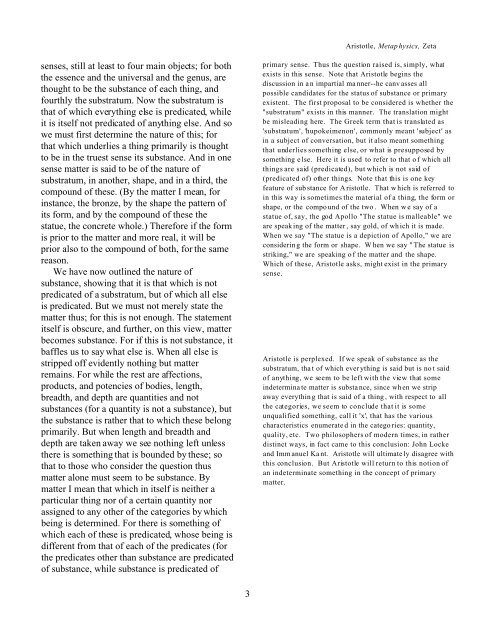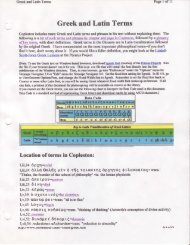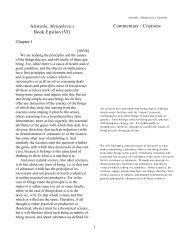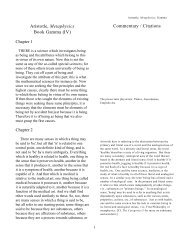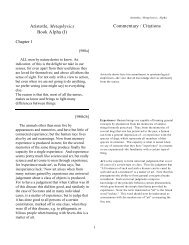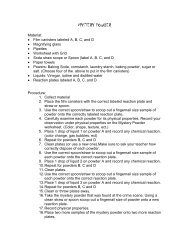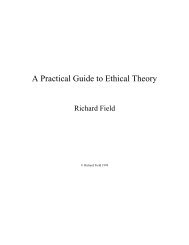Aristotle, Metaphysics Book Zeta (VII) Commentary ... - CATpages
Aristotle, Metaphysics Book Zeta (VII) Commentary ... - CATpages
Aristotle, Metaphysics Book Zeta (VII) Commentary ... - CATpages
Create successful ePaper yourself
Turn your PDF publications into a flip-book with our unique Google optimized e-Paper software.
<strong>Aristotle</strong>, <strong>Metaphysics</strong>, <strong>Zeta</strong><br />
senses, still at least to four main objects; for both<br />
the essence and the universal and the genus, are<br />
thought to be the substance of each thing, and<br />
fourthly the substratum. Now the substratum is<br />
that of which everything else is predicated, while<br />
it is itself not predicated of anything else. And so<br />
we must first determine the nature of this; for<br />
that which underlies a thing primarily is thought<br />
to be in the truest sense its substance. And in one<br />
sense matter is said to be of the nature of<br />
substratum, in another, shape, and in a third, the<br />
compound of these. (By the matter I mean, for<br />
instance, the bronze, by the shape the pattern of<br />
its form, and by the compound of these the<br />
statue, the concrete whole.) Therefore if the form<br />
is prior to the matter and more real, it will be<br />
prior also to the compound of both, for the same<br />
reason.<br />
We have now outlined the nature of<br />
substance, showing that it is that which is not<br />
predicated of a substratum, but of which all else<br />
is predicated. But we must not merely state the<br />
matter thus; for this is not enough. The statement<br />
itself is obscure, and further, on this view, matter<br />
becomes substance. For if this is not substance, it<br />
baffles us to say what else is. When all else is<br />
stripped off evidently nothing but matter<br />
remains. For while the rest are affections,<br />
products, and potencies of bodies, length,<br />
breadth, and depth are quantities and not<br />
substances (for a quantity is not a substance), but<br />
the substance is rather that to which these belong<br />
primarily. But when length and breadth and<br />
depth are taken away we see nothing left unless<br />
there is something that is bounded by these; so<br />
that to those who consider the question thus<br />
matter alone must seem to be substance. By<br />
matter I mean that which in itself is neither a<br />
particular thing nor of a certain quantity nor<br />
assigned to any other of the categories by which<br />
being is determined. For there is something of<br />
which each of these is predicated, whose being is<br />
different from that of each of the predicates (for<br />
the predicates other than substance are predicated<br />
of substance, while substance is predicated of<br />
primary sense. Thus the question raised is, simply, what<br />
exists in this sense. Note that <strong>Aristotle</strong> begins the<br />
discussion in an impartial ma nner--he canvasses all<br />
possible candidates for the status of substance or primary<br />
existent. The first proposal to be considered is whether the<br />
"substratum" exists in this manner. The translation might<br />
be misleading here. The Greek term that is translated as<br />
'substratum', 'hupokeimenon', commonly meant 'subject' as<br />
in a subject of conversation, but it also meant something<br />
that underlies something else, or what is presupposed by<br />
something else. Here it is used to refer to that of which all<br />
things are said (predicated), but which is not said of<br />
(predicated of) other things. Note that this is one key<br />
feature of substance for <strong>Aristotle</strong>. That which is referred to<br />
in this way is sometimes the material of a thing, the form or<br />
shape, or the compound of the two . When we say of a<br />
statue of, say, the god Apollo "The statue is malleable" we<br />
are speaking of the matter, say gold, of which it is made.<br />
When we say "The statue is a depiction of Apollo," we are<br />
considering the form or shape. W hen we say "The statue is<br />
striking," we are speaking of the matter and the shape.<br />
Which of these, <strong>Aristotle</strong> asks, might exist in the primary<br />
sense.<br />
<strong>Aristotle</strong> is perplexed. If we speak of substance as the<br />
substratum, that of which everything is said but is no t said<br />
of anything, we seem to be left with the view that some<br />
indeterminate matter is substance, since when we strip<br />
away everything that is said of a thing, with respect to all<br />
the categories, we seem to conclude that it is some<br />
unqualified something, call it 'x', that has the various<br />
characteristics enumerated in the catego ries: quantity,<br />
quality, etc. Two philosophers of modern times, in rather<br />
distinct ways, in fact came to this conclusion: John Locke<br />
and Immanuel Kant. <strong>Aristotle</strong> will ultimately disagree with<br />
this conclusion. But <strong>Aristotle</strong> will return to this notion of<br />
an indeterminate something in the concept of primary<br />
matter.<br />
3


